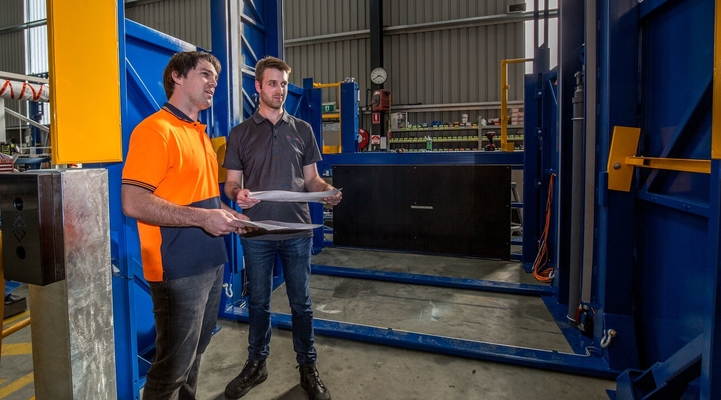Collaborative partnerships help Safetech capitalise on their point of difference
Safetech has long understood that maintaining the mantle of Australia’s premier dock products and lifting solutions company requires collaboration.
Safetech designs and manufactures a huge range of products. Their dock solutions can be found at just about every Coles, Woolworths and Aldi across Australia. Their scissor lifts are in use in some of the biggest mines in Western Australia. Lexus and Toyota regularly rely upon Safetech vehicle hoists, and the MGC water recycling plant boasts a custom designed and built Safetech freight hoist.
According to Lindsay Wakefield (Managing Director, Safetech), the diversity of their product range and client base is one of the reasons why Safetech relies upon a comprehensive network of local and international suppliers, partners, educational institutions, and even students.
“When it comes to our supply chain, we tackle the value-add components—the stuff that is more difficult to produce—in-house. Then, the more straight-forward components we buy in. For instance, we don’t specialise in metal fabrication. We leave this to expert welders. Instead, we take care of value-add components such as smart controls,” said Wakefield.
“We produce a lot of specialised, customised products for our clients. We’ve always focused on innovation and engineering, on designing new products, and adapting existing products for specialist applications tailored to our client’s needs.”
“We’ve found that overseas competitors are often unwilling or unable to adapt products to Australian companies’ wishes. By finding these companies and developing a flexible, fast-moving local capacity that can meet their requests, we’ve been able to carve out a point of difference within the local market.”
“Our unique approach—which relies upon this flexible, fast-moving local capacity—means that our supply chain is incredibly varied. Two thirds of what we produce is manufactured here in Australia, and the rest we source from overseas partners. As we’re based in regional Victoria ourselves, we try to support other regional and local businesses first. By networking and collaborating with our suppliers and partners, we can better deliver on our client’s needs,” said Wakefield.
Safetech’s collaborative approach to business doesn’t end with its supply chain. The company regularly works with both international and local universities, hosting interns from varied disciplines.
“We work with Aalborg University in Denmark, and have done for quite a few years. AlbaNova works hand-in-glove with their trainee engineers, which we have found very useful for our business. We currently have two engineering students, both of whom are towards the end of their degree, completing an internship with us.”
“We also have a student from the Philippines undertaking a four month placement in our online marketing and sales department. He is finishing his Master’s degree in business. And, of course, we regularly host local students and work closely with Federation University in Gippsland. Currently, we have three engineering students who work part-time in our engineering department, helping us with drafting.”
“We’ve always found working with interns and students beneficial. Oftentimes, they bring novel perspectives, fresh ideas and specialised strengths to Safetech. By working together with our in-house team, they really enable us to capitalise on our point of difference within the market: innovative, bespoke products.”
“It is possible to succeed in more traditional manufacturing industries if you understand your customers’ needs, your supply chain is designed to capitalise on your strengths, and you’re willing to take on-board innovative thinking and fresh ideas from a range of sources. Collaborative partnerships can be an important factor in helping you find, and then capitalise on, your point of difference,” said Wakefield.

